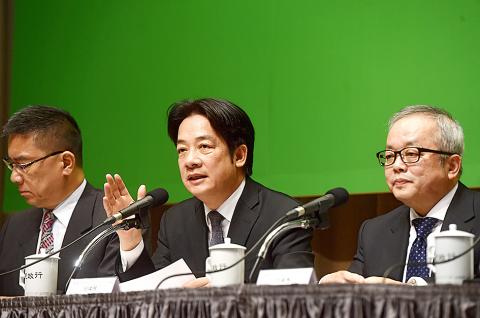The Executive Yuan yesterday unveiled a set of plans to increase the wages of low-paid workers, including hiking the minimum wage for government employees to NT$30,000 (US$1,009) per month, encouraging or pressing private firms to follow suit, and raising the statutory hourly wage rate to NT$150 from NT$140.
A Cabinet report presented by Vice Premier Shih Jun-ji (施俊吉) at a news conference showed the number of employees who earned less than NT$30,000 per month last year was about 3.051 million, or 34 percent of the employed population, 51.8 percent of whom were 15 to 29 years old.
Atypical workers — those who have no fixed term of employment, including part-time workers, outsourced workers and workers on temporary contracts — accounted for a large percentage of the low-wage population, the report showed.

Photo: Chien Jung-fong, Taipei Times
Last year, there were 805,000 atypical workers in the nation, accounting for 7.11 percent of the total working population, which was an increase of 155,000 from 2008, the report showed.
As of May last year, the average salary of atypical workers was about NT$22,550, just above the statutory minimum monthly wage of NT$22,000, Directorate-General of Budget, Accounting and Statistics data showed.
Of the 3.051 million people earning less than NT$30,000 per month, at least 19,410 were employed at listed companies, and 16,067 at government agencies, state-owned enterprises or government-funded institutions, the report showed.
That meant that nearly 99 percent were employees of small and medium-sized enterprises that were not listed on the stock exchange, the report said.
Shih said that under the Cabinet’s proposed “five major policies and 16 measures,” the monthly salary paid to the 16,067 people employed at government or state-run enterprises would be increased to NT$30,000, but that it would be done gradually to avoid disrupting the equity of the salary structure.
Such a move would cost the government an additional NT$962 million annually, he said, adding that listed companies should be responsible for raising the salaries of their own employees, which the Cabinet said would cost the firms an estimated NT$964 million annually.
Low pay is one of the issues that the public has asked the government to solve, and after several cross-departmental meetings, the Executive Yuan has proposed a strategy, Premier William Lai (賴清德) said.
In the short term, the government is to increase public workers’ salaries, include salary standards as a bonus item when accessing companies for government procurement and awards, encourage private businesses to raise salaries, make salaries transparent and raise the minimum hourly wage, he said.
In the medium-to-long term, the government is to increase investments, speed up industry upgrades, reduce the burden on employees, improve the quality of human resources and minimize the gap between academia and industry, he said.
The main issue is a lack of investment, Lai added.
President Tsai Ing-wen’s (蔡英文) proposed “five plus two” industrial innovation plan would help raise salaries, he said, adding that the Executive Yuan is to continue to push the strategy.
The Cabinet has also suggested raising the statutory hourly wage to NT$150 from NT$140 when the Basic Wage Deliberation Committee meets later this year to review minimum wages.
Additional reporting by Chen Yu-fu

MAKING WAVES: China’s maritime militia could become a nontraditional threat in war, clogging up shipping lanes to prevent US or Japanese intervention, a report said About 1,900 Chinese ships flying flags of convenience and fishing vessels that participated in China’s military exercises around Taiwan last month and in January last year have been listed for monitoring, Coast Guard Administration (CGA) Deputy Director-General Hsieh Ching-chin (謝慶欽) said yesterday. Following amendments to the Commercial Port Act (商港法) and the Law of Ships (船舶法) last month, the CGA can designate possible berthing areas or deny ports of call for vessels suspected of loitering around areas where undersea cables can be accessed, Oceans Affairs Council Minister Kuan Bi-ling (管碧玲) said. The list of suspected ships, originally 300, had risen to about

DAREDEVIL: Honnold said it had always been a dream of his to climb Taipei 101, while a Netflix producer said the skyscraper was ‘a real icon of this country’ US climber Alex Honnold yesterday took on Taiwan’s tallest building, becoming the first person to scale Taipei 101 without a rope, harness or safety net. Hundreds of spectators gathered at the base of the 101-story skyscraper to watch Honnold, 40, embark on his daredevil feat, which was also broadcast live on Netflix. Dressed in a red T-shirt and yellow custom-made climbing shoes, Honnold swiftly moved up the southeast face of the glass and steel building. At one point, he stepped onto a platform midway up to wave down at fans and onlookers who were taking photos. People watching from inside

Japan’s strategic alliance with the US would collapse if Tokyo were to turn away from a conflict in Taiwan, Japanese Prime Minister Sanae Takaichi said yesterday, but distanced herself from previous comments that suggested a possible military response in such an event. Takaichi expressed her latest views on a nationally broadcast TV program late on Monday, where an opposition party leader criticized her for igniting tensions with China with the earlier remarks. Ties between Japan and China have sunk to the worst level in years after Takaichi said in November that a hypothetical Chinese attack on Taiwan could bring about a Japanese

The WHO ignored early COVID-19 warnings from Taiwan, US Deputy Secretary of Health and Human Services Jim O’Neill said on Friday, as part of justification for Washington withdrawing from the global health body. US Secretary of State Marco Rubio on Thursday said that the US was pulling out of the UN agency, as it failed to fulfill its responsibilities during the COVID-19 pandemic. The WHO “ignored early COVID warnings from Taiwan in 2019 by pretending Taiwan did not exist, O’Neill wrote on X on Friday, Taiwan time. “It ignored rigorous science and promoted lockdowns.” The US will “continue international coordination on infectious